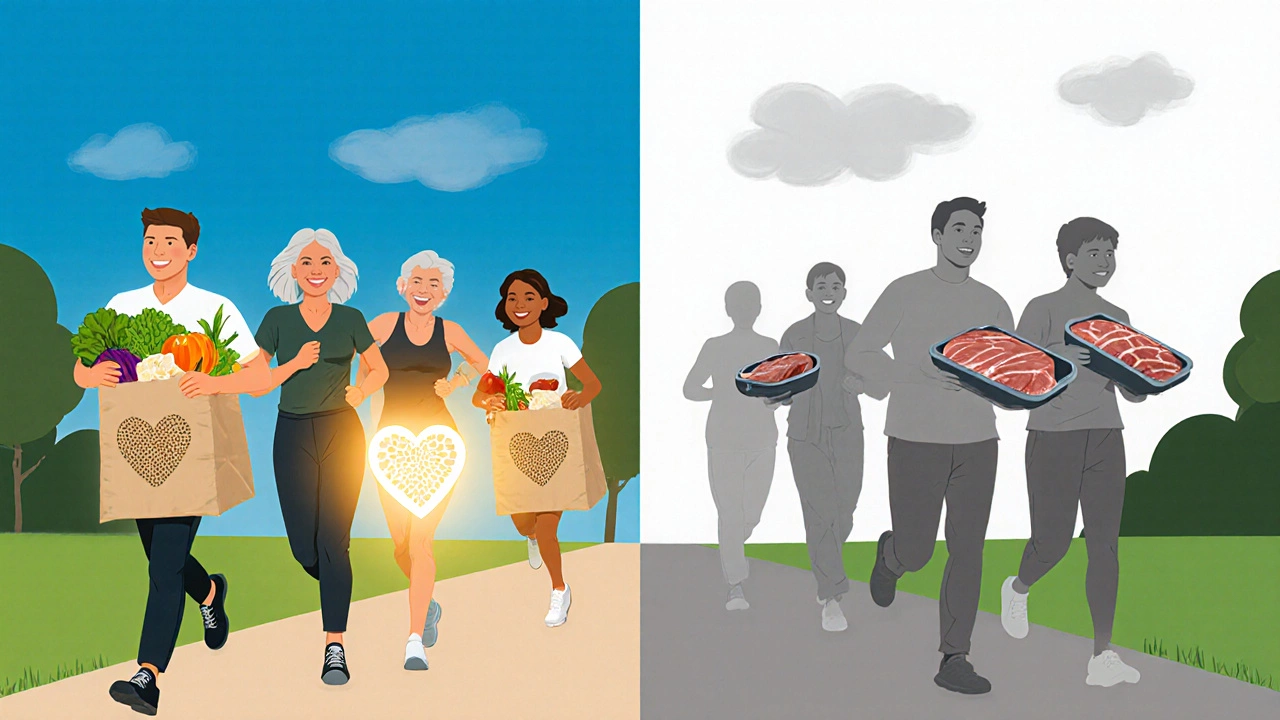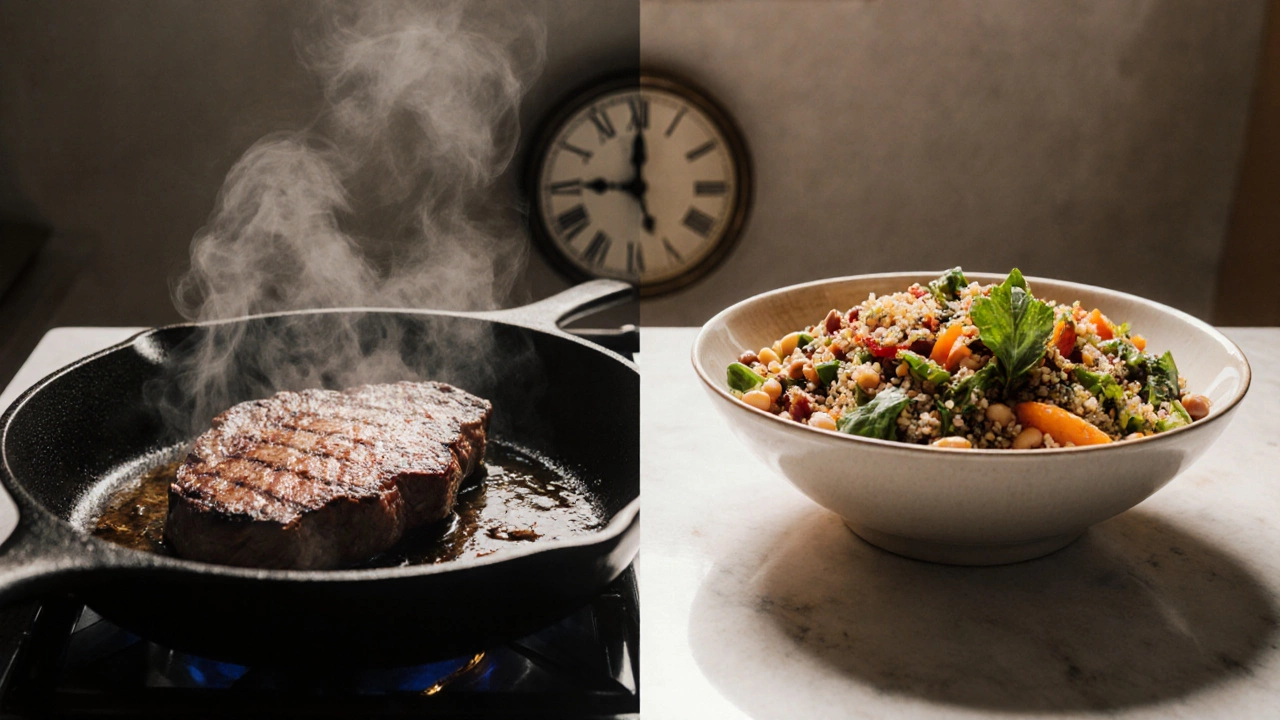Disease Risk Calculator
How Your Diet Affects Your Longevity
Based on the latest research, vegetarian diets can reduce your risk of major diseases and potentially add years to your life. This tool shows you the specific risk reduction for key health conditions based on your dietary choices.
Your Estimated Health Benefits
Cardiovascular Disease
Your relative risk:
Colorectal Cancer
Your relative risk:
What This Means
Based on research, vegetarians experience 30% lower risk of heart disease and 15% lower risk of colorectal cancer compared to meat-eaters. This translates to a potential lifespan extension of 1-3 years with a plant-focused diet.
Nutrient Considerations
Remember, these benefits are strongest when you ensure adequate intake of vitamin B12, iron, and omega-3 fatty acids. Consider adding fortified foods or supplements to your diet.
Your potential lifespan gain:
0
years longer than meat-eaters
Ever stared at your plate and wondered if swapping steak for beans could add years to your life? That question has haunted nutritionists, doctors, and anyone who’s ever been told “eat your veggies”. Below we unpack the science, break down the biggest studies, and give you practical takeaways without the hype.
Key Takeaways
- Large cohort studies consistently show that vegetarians live 1-3 years longer on average than regular meat‑eaters.
- The advantage is driven mainly by lower rates of cardiovascular disease and certain cancers.
- Benefits persist after accounting for smoking, socioeconomic status, and physical activity, but diet quality matters more than the label “vegetarian”.
- Potential downsides include lower intake of vitamin B12, iron, and omega‑3 fatty acids, which require careful planning.
- Switching to a mostly plant‑based diet can improve health markers within months, even if you don’t go fully vegetarian.
When researchers talk about the vegetarian diet is a dietary pattern that excludes meat, poultry, and fish, focusing on plant‑based foods such as vegetables, legumes, grains, nuts, and fruits, they often compare it to a meat‑based diet that includes regular portions of animal flesh plus typical side dishes. The core of the debate is whether the first actually translates into a longer life expectancy is the average number of years a person can expect to live based on current mortality rates for a given group.
How Scientists Measure Longevity
Most evidence comes from long‑term cohort studies that follow thousands of participants for 10, 20, or even 30 years. Researchers record diet at baseline (often using food‑frequency questionnaires), then track mortality outcomes through national registries. They calculate hazard ratios (HR) that compare the risk of death for vegetarians versus meat‑eaters while adjusting for age, sex, smoking status, alcohol intake, physical activity, and socioeconomic factors.
Two metrics matter most:
- All‑cause mortality: death from any cause, providing a broad picture of overall health.
- Cause‑specific mortality: deaths attributed to heart disease, cancer, diabetes, etc., which reveal where diet makes the biggest impact.
Because diet is only one piece of the lifestyle puzzle, high‑quality studies use extensive statistical controls and, when possible, repeat dietary assessments to capture changes over time.
What the Biggest Studies Say
The EPIC‑Oxford study is a prospective cohort of over 60,000 UK adults that has tracked dietary patterns for more than two decades found that vegetarians and vegans combined had a 12% lower risk of all‑cause mortality (HR0.88) compared with meat‑eaters. When broken down, lifelong vegetarians lived about 1.1 years longer, while vegans saw a 3.3‑year advantage.
A meta‑analysis published in The American Journal of Clinical Nutrition pooled data from 15 cohort studies covering 1.2million participants. The authors reported a pooled HR of 0.93 for all‑cause mortality among vegetarians, translating to roughly a 2‑year life‑span gain on average.
In the Adventist Health Study‑2, which focuses on a predominantly North‑American Seventh‑Day Adventist population, strict vegetarians (no meat, fish, or dairy) had a 15% lower risk of death than non‑vegetarians (HR0.85). The effect was strongest for cardiovascular disease, where the hazard dropped by 30%.
Importantly, these benefits persisted after adjusting for body mass index (BMI) is a measure of body fat based on height and weight, commonly used in health research and physical activity levels, suggesting that the diet itself, not just a slimmer waistline, provides protection.

Why Vegetarians Tend to Live Longer
Three primary mechanisms get cited across the literature:
- Lower saturated fat and cholesterol intake: Plant foods contain little to no cholesterol and less saturated fat, which helps keep blood lipids in a healthy range.
- Higher fiber and antioxidant consumption: Whole grains, legumes, fruits, and vegetables boost gut health and reduce oxidative stress, both linked to heart disease and cancer prevention.
- Better weight management: On average, vegetarians have a lower BMI is a measure of body fat based on height and weight, commonly used in health research (23kg/m² vs 27kg/m² for meat‑eaters), which lowers strain on the cardiovascular system.
When we look at cardiovascular disease is a group of disorders affecting the heart and blood vessels, including heart attacks and strokes, the data are striking. Vegetarian cohorts experience 20-30% fewer heart attacks and a similar drop in stroke incidence. For cancer incidence is the occurrence of new cancer cases in a population, often expressed per 100,000 people, the risk reduction is modest (about 10% lower overall) but more pronounced for colorectal and breast cancers.
| Metric | Vegetarian (average) | Meat‑eater (average) |
|---|---|---|
| Life expectancy increase | +1.1years | Baseline |
| All‑cause mortality HR | 0.93 | 1.00 |
| Cardiovascular disease HR | 0.70 | 1.00 |
| Colorectal cancer HR | 0.85 | 1.00 |
| Average BMI (kg/m²) | 23 | 27 |
| Average daily protein (g) | 65 | 80 |
| Average daily iron (mg) | 12 | 14 |
Potential Nutrient Gaps and How to Fill Them
Going vegetarian isn’t a free pass to ignore nutrition. The most common shortfalls are vitamin B12, iron, zinc, calcium, and long‑chain omega‑3 fatty acids (EPA/DHA). Here’s a quick cheat‑sheet:
- Vitamin B12: fortified cereals, plant milks, or a daily supplement of 2-3µg.
- Iron: combine lentils or beans with vitaminC‑rich foods (citrus, bell peppers) to boost absorption.
- Omega‑3: algae‑based supplements or walnuts, chia seeds, and flaxseed oil.
- Zinc: pumpkin seeds, chickpeas, and whole grains.
- Calcium: fortified tofu, kale, broccoli, and fortified plant milks.
When these nutrients are adequately covered, the health advantages of a plant‑forward diet become even more pronounced.
Practical Steps If You’re Curious About Switching
Transitioning doesn’t have to be all‑or‑nothing. A “flexitarian” approach-cutting down red meat to a few times per month-already shows measurable benefits in blood pressure and cholesterol. If you decide to go full‑time vegetarian, follow this simple roadmap:
- Start with a weekly “Meat‑Free Monday” and expand.
- Plan meals around a protein source (tofu, tempeh, beans) and at least two vegetables.
- Track your B12 intake; set a reminder for supplementation.
- Replace processed meat with whole‑food alternatives (e.g., lentil loaf instead of sausage).
- Schedule a yearly blood test to monitor iron, B12, and lipid profiles.
Most people notice improved energy and digestive comfort within a month, and longer‑term studies suggest that these early wins cascade into lower disease risk later on.

Common Myths Debunked
Myth 1: “Vegetarians automatically eat less protein.”
Data from the NHANES survey shows vegetarians average 65g of protein daily-well above the recommended 46g for women and 56g for men-thanks to beans, dairy, eggs, and soy products.
Myth 2: “A vegetarian diet is always healthier.”
Processed veggie burgers, fries, and sugary smoothies can be high in sodium, saturated fat, and empty calories. The health edge comes from whole, minimally processed plant foods.
Myth 3: “If you’re vegetarian, you can’t get enough iron.”
Non‑heme iron from plants is less absorbable, but pairing iron‑rich foods with vitaminC can double absorption, making a well‑planned vegetarian diet sufficient for most people.
Bottom Line: Does the Vegetarian Lifestyle Extend Your Years?
Most rigorous research points to a modest but consistent longevity advantage-about a 1‑to‑3‑year increase in vegetarian lifespan compared with a typical meat‑based pattern. The gain isn’t magical; it’s the result of lower heart disease, reduced cancer risk, healthier body weight, and a diet rich in fiber and antioxidants. However, the benefit hinges on eating nutrient‑dense plant foods and filling known vitamin/mineral gaps.
If you value those extra years (and better health in the meantime), shifting toward more plant‑based meals is a scientifically backed move. Even small, sustainable changes can pay off.
Frequently Asked Questions
Do vegans live longer than vegetarians?
Yes, most studies show vegans have a slightly larger lifespan advantage-about 2-4 years-mainly because they avoid dairy and eggs, which can add saturated fat and cholesterol. However, the sample sizes for vegans are smaller, so the confidence interval is wider.
Can a low‑meat diet provide the same health benefits?
A “flexitarian” pattern-eating meat only a few times a month-does reduce cardiovascular risk and can improve cholesterol levels, but the magnitude is usually less than that of a full vegetarian diet.
What’s the biggest mistake new vegetarians make?
Relying on processed meat substitutes and neglecting micronutrients like B12 and iron. Whole foods and proper supplementation are key to reaping the longevity benefits.
How quickly can I see health improvements after going vegetarian?
Many people notice lower blood pressure and better digestion within 4‑6 weeks. Blood lipid improvements often appear after 2‑3 months, while long‑term disease risk drops become evident after years of consistent eating.
Is a vegetarian diet safe for children and pregnant women?
Yes, provided they get enough protein, iron, calcium, DHA, and B12. Consulting a dietitian ensures the diet meets the higher nutrient demands of growth and fetal development.

